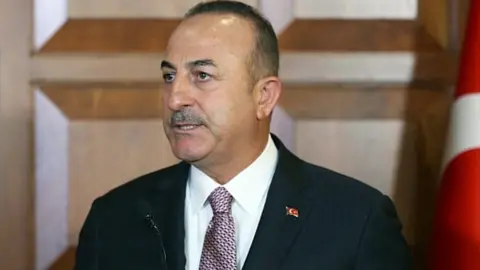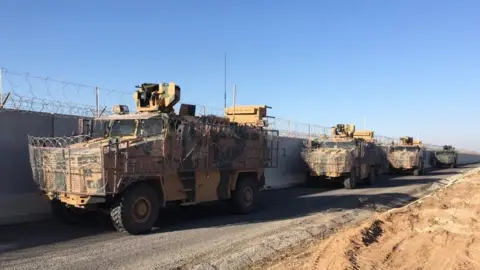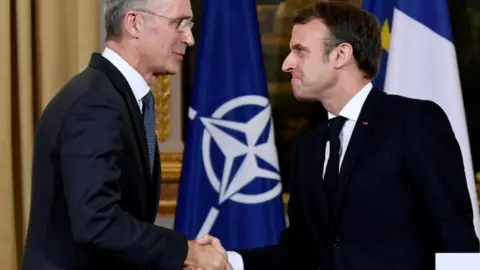Macron is a sponsor of terrorism, says Turkish foreign minister
 EPA
EPATurkey's foreign minister has accused French President Emmanuel Macron of being a "sponsor of terrorism", dismissing the French leader's criticism of Turkey's Syria offensive.
Mevlut Cavusoglu told reporters that Mr Macron wanted to be the leader of Europe but was "wobbling".
Last month Mr Macron angered Turkey by hosting an official from the Kurdish-led Syrian Democratic Forces (SDF).
Turkey views a section of the group - the YPG - as terrorists.
The spat between Turkey and France comes in the week before the two Nato allies are due to attend a summit of the alliance in the UK.
Earlier on Thursday, Mr Macron said he stood by comments made three weeks ago when he described Nato as "brain dead".
He said members of the alliance needed a "wake-up call" as they were no longer co-operating on a range of key issues.
He also criticised Nato's failure to respond to the military offensive by Turkey in northern Syria.
What did Cavusoglu say?
Addressing reporters in parliament on Thursday, Mr Cavusoglu said: "He [Macron] is already the sponsor of the terrorist organisation and constantly hosts them at the Elysee. If he says his ally is the terrorist organisation... there is really nothing more to say.
"Right now, there is a void in Europe, [Macron] is trying to be its leader, but leadership comes naturally."
Turkey was angered when Mr Macron held talks in Paris on 8 October with SDF spokeswoman Jihane Ahmed.
Mr Macron's office said the meeting was to express France's solidarity with the SDF in its fight against the Islamic State group, and also to reiterate concerns about the prospect of a Turkish military operation in Syria.
 Getty Images/TURKISH DEFENSE MINISTRY
Getty Images/TURKISH DEFENSE MINISTRY A day later, Turkey launched an offensive in northern Syria to create a "safe zone" cleared of Kurdish militias.
Ties between Turkey and its Nato allies have been under strain since Ankara bought the advanced Russian S-400 surface-to-air missile system earlier this year.

The last thing Nato needs

With only days before next week's brief Nato summit outside London, this row between France and Turkey is the last thing the alliance needs.
It illustrates how events in north-eastern Syria are straining relations within Nato. President Macron has repeatedly criticised both Washington's abrupt withdrawal of support for the Kurds and Turkey's related offensive into Syria - two strategic decisions that were taken without consulting other Nato allies.
Turkey, for its part, sees France as far too friendly towards the Kurds. It wants Nato as a whole to back its position in Syria. Above all this episode underscores Turkey's drift away from Nato and the West. Its purchase of a sophisticated Russian air defence system is an extraordinary step for a Nato ally.
The problem is that Turkey's size and geographical position make it an important, albeit for many a troublesome, player in Nato despite some analysts questioning if it really should be in the alliance at all.

What did the French president say?
Mr Macron was speaking at a news conference with Nato Secretary General Jens Stoltenberg, in the week before alliance leaders meet in the UK for its 70th anniversary.
In a 7 November interview, Mr Macron stressed what he saw as a waning commitment to the transatlantic alliance by its main guarantor, the US. Allies said at the time they disagreed with his assessment.
"I totally stand by raising these ambiguities because I believe it was irresponsible of us to keep talking about financial and technical matters given the stakes we currently face," he said on Thursday.
 Reuters
Reuters"A wake-up call was necessary. I'm glad it was delivered, and I'm glad everyone now thinks we should rather think about our strategic goals."
On Turkey, he said he respected its security interests after it suffered "many terrorist attacks on its soil".
But he added: "One cannot on one hand say that we are allies, and with respect to this demand our solidarity; and on the other hand, put its allies in the face of a military offensive done as a 'fait accompli' which endangers the action of the coalition against Islamic State, which Nato is part of."
Mr Macron said Nato needed to clarify who or what the alliance stood against, adding that he disagreed that Russia or China were the enemies.
What's the issue with Nato?
US President Donald Trump's abrupt decision to pull most US forces out of north-eastern Syria in October took European Nato members by surprise.
The move opened the way for Turkey to push into Syria and create what it termed a security zone along its border. Kurdish forces, which had been helping the US fight the Islamic State group, were expelled from the area.
Mr Trump has frequently accused European Nato members of failing to provide their fair share of military spending and for relying too heavily on the US for their defence.
